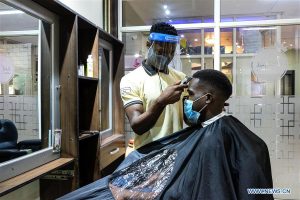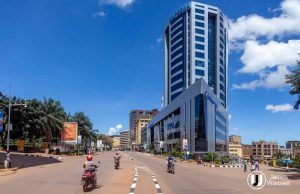
#OutToLunch The future of work – salon masseuse
#OutToLunch The future of work – salon masseuse By Denis Jjuuko The male salon business has evolved especially in urban centres. Although salons always existed at least in Kampala, they were for the rich and upper class. Some mothers owned a pair of scissors and did the job at home to mainly their children. As children grew, the mothers relegated the job to the children to cut each other’s hair. The men who couldn’t afford a proper salon always visited some barber under a mango tree who had a manual hair clipper and one would pray, the graduated tax collector didn’t show up in the middle of the haircut. Many men were left with hair half done, the barber preferring to run whenever the graduated tax collector showed up. Rain was another problem but at least, unlike today, that was predictable. With improvements in technology, modern salons started being set up with electric hair clippers, fancy chairs, and warm water to wash the head after a hair cut. Some new ‘innovation’ is now taking place in Kampala’s salons for men. After most likely a male barber has cut your hair, he beckons you to a tub where a mostly stunningly beautiful young woman would wash your head after which they would smear some oil and other stuff all over your face and neck and sometimes chest. If you are wearing a short-sleeved shirt, your arms may also not be spared. If you go for a pedicure, the thighs will also be smeared. They will proceed to give you what they call a massage, which though most times is just touching. I am told some weak men moan as a result of some form of pleasure out of this exercise but I am yet to confirm this. A friend who set up a salon recently about 20km out of Kampala’s central business district hired one of these ‘masseuses’ from the city. Her customers who are mainly male have since followed her — they drive 20km to have her delicate fingers all over their necks, shoulders and I think chests. In some salons, they first request whether they give you the ‘massage’ or they simply apply after-shave gels. In other salons, you simply realize you are being ‘massaged’ and your head being almost touched by some breasts made obviously bigger by some push-up bras. All this is done in the name of providing an unforgettable customer experience. Whereas it used to take men about 30 minutes in a salon, these days it could take upwards of two hours! This reminds me of a newspaper article I read sometime back written by a popular Kampala physician whose leg was amputated after undergoing a massage by an unqualified masseuse. The masseuse touched veins she wasn’t meant to leading to an illness. The physician traveled to India and returned without one of his legs. Are the salon masseuses qualified to turn around our necks or we may end up with all sorts of illnesses? Since I am told men enjoy these salon ‘massages’, there is need to ensure that the ‘masseuses’ offering them aren’t just beautiful women rather qualified ones to offer the service. They should have a certificate from an accredited institution to offer such training. So since salon massaging is becoming increasingly popular, this could be the future of work for a lot of our unemployed people. The home salon is long dead especially in urban areas and salons are opened up almost every day. As Kampala expands, there will be need for more salons in the new upcoming residential areas for the middle class. The service fake masseuses are offering in salons is a technical one which like we saw with the physician could lead to severe health consequences. A new profession has already been started without albeit the necessary qualification. If we can work on regulation as a country, there will be need for qualified people to work as salon masseuses. Also professionalizing this ‘profession’ will ensure that the salon masseuses aren’t offering something close to one sided foreplay and remain within what is acceptable in a public place. Customers will appreciate a professional touch as well because massages which are properly done have some health benefits. So if you are looking for a career, this is something you may think of. The writer is a Communication and Visibility Consultant. djjuuko@gmail.com



